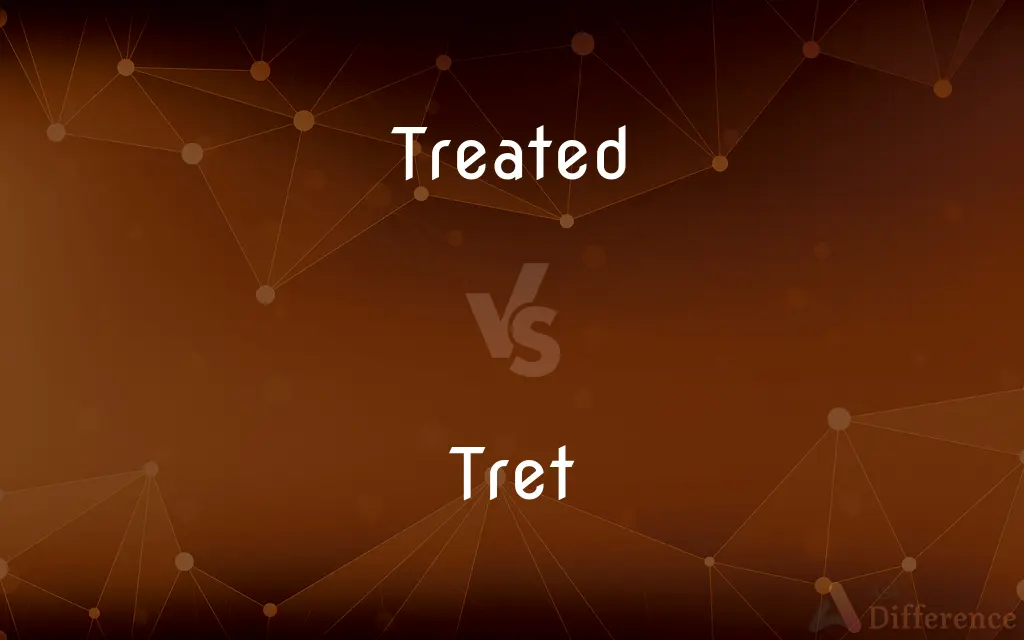Treated vs. Tret — What's the Difference?
By Urooj Arif & Maham Liaqat — Updated on April 25, 2024
Treated refers to the application of a process, while tret is an allowance made for the weight of packaging.

Difference Between Treated and Tret
Table of Contents
ADVERTISEMENT
Key Differences
Treated encompasses actions where something undergoes a process to alter its state, enhance its properties, or protect it, such as wood being treated with chemicals to prevent rot. Tret, on the other hand, is a less commonly used term today, historically significant in trade and shipping, referring to an allowance made for the weight of packaging or container, ensuring the net weight of the product is charged.
In healthcare, treated is used to describe the medical care given to improve a patient's condition, such as being treated with medication. Tret doesn't find a place in this context as it specifically relates to the adjustment in the weight of goods for the packaging during the process of trade.
When materials or fabrics are treated, they are subjected to processes that alter their characteristics, like being made waterproof or fire-resistant. Tret, contrasting sharply, is a concept from the realm of commerce, focusing on the fairness and accuracy of trade practices by accounting for the weight of packaging materials.
Treated also applies to how individuals or situations are handled or dealt with, indicating the manner or approach taken, such as being treated fairly in negotiations. Tret, however, remains in the domain of goods and trade, where it's used to ensure that the buyer pays only for the actual product, not the packaging.
Treated involves a wide range of applications from healthcare to materials science, signifying the act of applying a process. Tret is a specialized term in trade, specifically addressing the allowance for packaging weight, a distinction that highlights the practical versus the commercial.
ADVERTISEMENT
Comparison Chart
Definition
Undergoing a process to alter or improve.
An allowance for the weight of packaging in trade.
Context of Use
Healthcare, materials science, personal and social care.
Historical commerce and trade.
Application
To improve health, enhance properties, or address issues.
To adjust for the weight of packaging in the net weight.
Examples
Chemically treating wood, treating a patient.
Deducting packaging weight in shipping.
Outcome/Intent
Alteration, improvement, or protection.
Fairness and accuracy in the weight and cost of goods.
Compare with Definitions
Treated
Subjected to a process to change or improve.
The fabric was treated to become water-resistant.
Tret
Historical trade term for packaging weight adjustment.
Merchants in the 18th century calculated tret for overseas shipments.
Treated
Dealt with in a certain way.
Guests at the hotel are treated like royalty.
Tret
A deduction from gross weight.
Tret accounts for the packaging, ensuring accurate pricing.
Treated
To attempt to cure or mitigate (a disease or condition).
The condition can be treated with medication and diet.
Tret
Refers to the fairness in trade transactions.
Tret ensured buyers received the actual weight of the product they paid for.
Treated
Given medical care or therapy.
The patient was treated for dehydration.
Tret
An allowance for the weight of packaging.
The tret was deducted to calculate the net weight of the shipment.
Treated
Coated or covered with a substance.
The wood was treated with a protective varnish.
Tret
A practice in weighing goods for trade.
Tret adjustments were common in trading spices.
Treated
To act or behave in a specified manner toward
Treated me fairly.
Tret
(obsolete) An allowance to purchasers, for waste or refuse matter, of four pounds on every 104 pounds of suttle weight, or weight after the tare is deducted.
Treated
To regard and handle in a certain way. Often used with as
Treated the matter as a joke.
Tret
Simple past tense and past participle of treat
Treated
To deal with in writing or speech; discuss
A book that treats all aspects of health care.
Tret
An allowance to purchasers, for waste or refuse matter, of four pounds on every 104 pounds of suttle weight, or weight after the tare deducted.
Treated
To deal with or represent artistically in a specified manner or style
Treats the subject poetically.
Treated
To provide with food, entertainment, or gifts at one's own expense
Treated her sister to the theater.
Treated
To give (someone or oneself) something pleasurable
Treated herself to a day in the country.
Treated
To subject to a process, action, or change, especially to a chemical or physical process or application
Treated the cloth with bleach.
Treated
To give medical aid to (someone)
Treated many patients in the emergency room.
Treated
To give medical aid to counteract (a disease or condition)
Treated malaria with quinine.
Treated
To deal with a subject or topic in writing or speech. Often used with of
The essay treats of courtly love.
Treated
To pay for another's entertainment, food, or drink.
Treated
To engage in negotiations, as to reach a settlement or agree on terms
"Both sides nonetheless are quite willing to treat with [the king]" (Gregory J. Wallance).
Treated
Something, such as one's food or entertainment, that is paid for by someone else.
Treated
A source of a special delight or pleasure
His trip abroad was a real treat.
Treated
Simple past tense and past participle of treat
Treated
Subject to treatment or an action.
Treated
Subjected to a physical (or chemical) treatment or action or agent;
The sludge of treated sewage can be used as fertilizer
Treated timbers resist rot
Treated fabrics resist wrinkling
Treated
(of a specimen for study under a microscope) treated with a reagent or dye that colors only certain structures
Treated
Given medical care or treatment;
A treated cold is usually gone in 14 days; if left untreated it lasts two weeks
Treated
Made hard or flexible or resilient especially by heat treatment;
A sword of tempered steel
Tempered glass
Common Curiosities
Can animals be treated for diseases?
Yes, animals can be treated for diseases with veterinary care, including medication and surgery.
Can people be treated for any condition?
Yes, people can be treated for various conditions, depending on the ailment and available medical interventions.
What does it mean to have wood treated?
Having wood treated means applying chemicals or processes to protect it from rot, pests, or weather.
Is tret still used in modern commerce?
Tret is rarely used in modern commerce, having been replaced by more precise weighing and pricing technologies.
How does treating fabric benefit it?
Treating fabric can make it waterproof, stain-resistant, or fire-retardant, enhancing its durability and utility.
What was the purpose of tret in historical trade?
The purpose of tret was to ensure fairness in trade by adjusting the weight of goods for the packaging, so buyers only paid for the product.
Can individuals be treated unjustly?
Yes, individuals can be treated unjustly, referring to unfair or prejudicial treatment in various contexts.
Can treating a material change its appearance?
Yes, treating a material can change its appearance, such as staining wood or dyeing fabric.
What impacts does unfair treatment have on individuals?
Unfair treatment can have psychological, emotional, and sometimes physical impacts on individuals.
Is there a modern equivalent to tret in commerce?
Modern commerce uses detailed weight and cost adjustments, but the principle of deducting packaging weight is akin to tret.
What difference does tret make in shipping?
Tret makes a difference in shipping by ensuring the weight and cost charged reflect only the goods, not the packaging.
How is tret calculated in trade?
Historically, tret was calculated as a percentage deduction from the gross weight to account for packaging.
How does treating a patient differ from treating a material?
Treating a patient involves medical interventions for health conditions, while treating a material involves applying processes or substances to change its properties.
Are there any goods exempt from tret adjustments?
Historically, goods that did not require packaging or where the packaging was negligible might have been exempt from tret adjustments.
Why is treating water important?
Treating water is important to remove contaminants and make it safe for drinking and other uses.
Share Your Discovery

Previous Comparison
Law vs. Taw
Next Comparison
O vs. OrAuthor Spotlight
Written by
Urooj ArifUrooj is a skilled content writer at Ask Difference, known for her exceptional ability to simplify complex topics into engaging and informative content. With a passion for research and a flair for clear, concise writing, she consistently delivers articles that resonate with our diverse audience.
Co-written by
Maham Liaqat















































